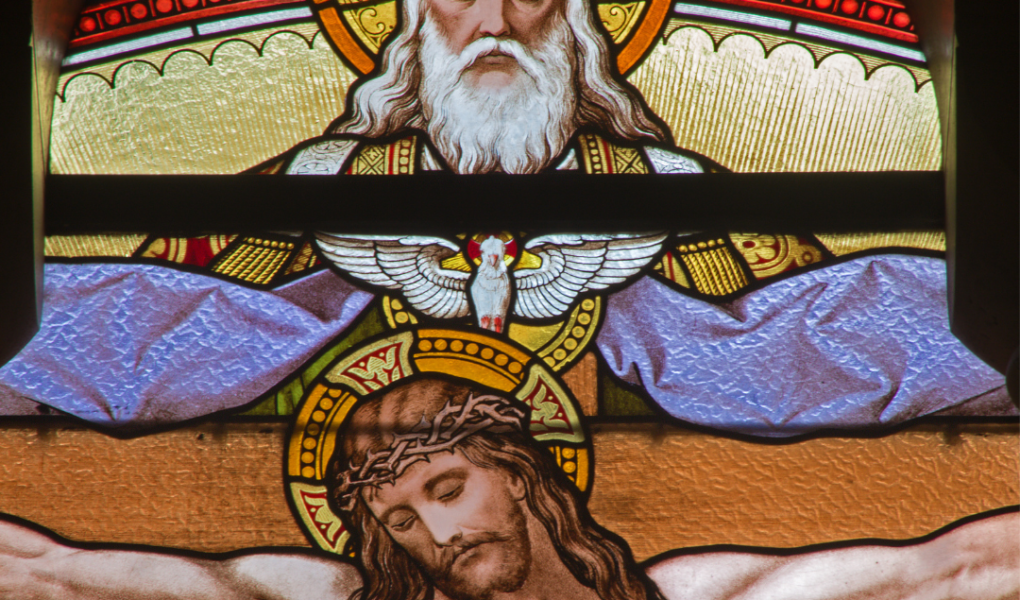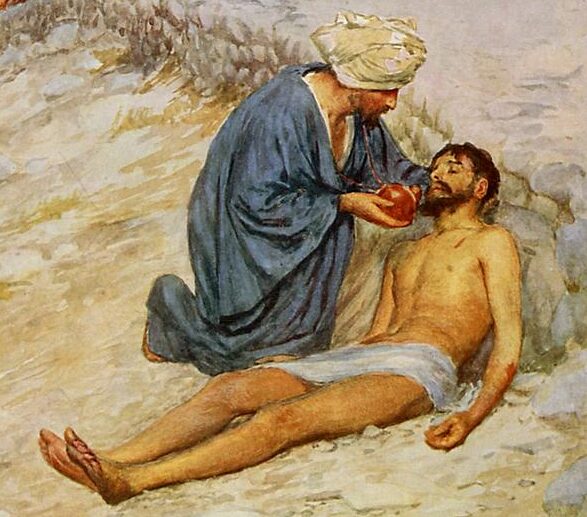*NOTE: This essay was written for a school assignment. While I was limited to the texts assigned and to the KJV, the theme is my own. Since I received a good grade I thought I would share. I hope you enjoy!
It is natural for humanity to long for intimacy within the family unit. And it is well-known that individuals thrive and find happiness when family members are intimate with each other—when they lovingly involve themselves in each other’s lives and support one another. Children thrive when they have meaningful relationships with their parents and many parents find fulfillment and joy when they engage in their children’s lives. For many parents, their joys are in their children’s joys and their sadness is in their children’s sadness. There is no greater sadness for a parent whose child rebels against them by turning away from the values and teachings they have taught the child to exemplify. Many religions and cultures throughout the ages reflect the familial relationship within their religion. For the Christian, God is the father and humanity is His child. The Bible offers several examples of God as a father. For example, in the Old Testament we have the creation stories, the fall of man and woman, and the story of Noah. In the New Testament we have the story of Christ’s birth found in the Gospel of Luke. In these examples and stories, God is not only the creator of humanity, he acts as a father who desires to not just meet the basic material needs of His children, but to engage in an intimate relationship with them. Additionally, he shows his fatherhood when they rebel against Him and the values He has taught them, He becomes, like any father would become, sad and angry.
God as Creator and Father in The Creation Stories
In Genesis chapters 1-3 God becomes not just the powerful creator of humanity, but also the father of humanity. He does this by creating mankind, giving them their basic needs, and by demonstrating a desire to have an intimate relationship with them. In the first story of creation found in Genesis chapters 1-2:3, God becomes the powerful creator of the world, a place where mankind’s basic needs can be met. He speaks and it becomes, “And God said, Let there be light: and there was light…” (“Bible Gateway Passage: Genesis 1-3 – King James Version”). While God demonstrates his power and ability to give humanity their basic needs when what he says comes into being, he also demonstrates a desire to be intimate with mankind when he creates mankind:
And God said, Let us make man in our image, after our likeness: and let them have dominion… over all the earth, and over every creeping thing that creepeth upon the earth. (“Bible Gateway Passage: Genesis 1-3 – King James Version”)
By making mankind in His image and by giving mankind dominion “over all the earth” (“Bible Gateway Passage: Genesis 1-3 – King James Version”), God reveals that mankind is special to Him. Not only does God make mankind in His image and likeness, similar to the way a human child reflects the image of his or her parents, God desires and gives His human creation the fruits of his work—like a father spending the money he makes at work to support the well-being of his child.
God also expresses his power and fatherly love for his human creation in the second creation story found in Genesis 2:4-15. When God creates man, He “formed man of the dust of the ground, and breathed into his nostrils the breath of life” (“Bible Gateway Passage: Genesis 1-3 – King James Version”)… The use of the word “formed” gives the reader an image of God kneeling in the dirt and using His hands to literally form man out of the ground—an image of creation and intimacy. Additionally, the phrase “breathed into his nostrils…” gives the reader the impression that God is kneeling beside Adam and breathing into him—another image of creation and intimacy.
An additional image of intimacy is drawn when God creates woman. God creates woman out of the bone and flesh of man. Genesis 2:22 says, “And the rib, which the Lord God had taken from man, made he a woman, and brought her unto the man” (“Bible Gateway Passage: Genesis 1-3 – King James Version”). Because God made woman out of the same flesh that he formed out of the ground and breathed His own life-giving spirit into, it can be reasoned the God wants to not just be the creator of man and woman, but also the father of man and woman. This is not just evident in the way God creates man and woman in the second creation story, it is also evident through His gifts to the man and woman after they are created.
As in the first creation story, God gives nearly all of what He has created, the fruits of His work, to the man and woman He has created in the second creation story. We know this from Genesis chapter 2:15 which says, “And the Lord God took the man, and put him into the garden of Eden to dress and keep it” (“Bible Gateway Passage: Genesis 1-3 – King James Version”) and from Genesis chapter 2:18 which refers to woman, “And the Lord God said, It is not good that the man should be alone; I will make an help meet for him” (“Bible Gateway Passage: Genesis 1-3 – King James Version”). Since the man and woman are given dominion over the garden, we know they are special to God. They are inheriting Gods’ creation, like a child inherits the work and territory of his or her human father—a sign that God is not just a creator, He is a father who desires intimacy with his human creation.
God as Creator and Father in The Story of The Fall of Mankind
God is also described as a father in Genesis chapter 3, the story of the fall of mankind. Like a father, God warns the man and the woman against what is not good for them in Genesis 3:3:
But of the fruit of the tree which is in the midst of the garden, God hath, said, Ye shall not eat of it, neither shall ye touch it, lest ye die (“Bible Gateway Passage: Genesis 1-3 – King James Version”).
And when they disobey in Genesis 3:6, “… the woman…did eat… and he did eat” (“Bible Gateway Passage: Genesis 1-3 – King James Version”), God, much like a father, whose child has decided they know better than the parent, becomes angry in Genesis 3:14 saying, “What is this thou hast done” (“Bible Gateway Passage: Genesis 1-3 – King James Version”)? Although God is angry with them for their disobedience and although God allows and gives them consequences for their actions, He is not without care for them. He still gives them what they need, even creating clothing for them in Genesis 3:21, “Unto Adam also and to his wife did the Lord God make coats of skin, and clothed them” (“Bible Gateway Passage: Genesis 1-3 – King James Version”). Once again, this demonstrates the theme of God as a father in the Bible.
God as Creator and Father in The Story of Noah
The theme of God as a father in the Bible is also described in the story of Noah, found in Genesis chapters 6-9. When man does not follow God’s will, God acts as a father toward Noah, protecting him from the evil and violence of those around him, much like a father would protect a child. Most children find grace in the eyes of their parents, despite the evil going on around them. And even if a child is involved in evil or something that a parent disproves of, many good parents will act mercifully. They will allow the child to suffer the consequences of the evil around them while also helping them through the consequences of that evil. God does just this for Noah.
Genesis chapter 6:8-9 says, “But Noah found grace in the eyes of the Lord… and Noah walked with God” (“Bible Gateway Passage: Genesis 6-9 – King James Version”). Noah, though surrounded by evil, is described as walking with God. God, as a father, does not leave his child’s side.
Additionally, God shows himself as a father to Noah when he gives Noah a warning that he is going to destroy the evil going on in the world, in Genesis 6:13-14, “… the earth is filled with violence through them… I will destroy them with the earth… Make thee an ark” (“Bible Gateway Passage: Genesis 6-9 – King James Version”)… The fact that Noah walks with God, hears God’s warning, and listens to God’s instructions implies a deep intimacy. For Noah to take God’s warning and instruction means that Noah trusts God and has an ongoing, personal relationship with God. The instructions God gave were not simple. Not only did Noah have to build an ark, he had to build an ark large enough to carry his family, two of every creature, and their food, as stated in Genesis 6:18-21 (“Bible Gateway Passage: Genesis 6-9 – King James Version”).
God also demonstrates himself as a father to Noah after the flood by renewing the earth after the flood and giving Noah, like He did the man and woman in Genesis, dominion over His creation. Genesis 9:3 states, “Every moving thing that liveth shall be meat for you; even as the green herb have I given you all things” (“Bible Gateway Passage: Genesis 6-9 – King James Version”). Once again, as a child inherits the work of his or her father, Noah inherits the work of God’s new creation. And God reminds Noah that man is created in the image and likeness of God in Genesis 9:6, “… for in the image of God made he man” (“Bible Gateway Passage: Genesis 6-9 – King James Version”). As we saw in Genesis, God’s fatherhood is reflected and parallels the way a child is made to look like his parents.
God as Creator and Father in The Gospel of Luke
We also see the theme of God as creator and father in the Gospel of Luke. God shows his creational power and desire for intimacy with His creation in Luke 1:35 by sending himself in the form of a baby into the Virgin Mary:
And the angel answered and said unto her, The Holy Ghost shall come upon thee, and the power of the Highest shall overshadow thee: therefore also that holy thing which shall be born of thee shall be called the Son of God (“Bible Gateway Passage: Luke 1-3 – King James Version”).
Through the incarnation of His son, Jesus, who is fully human, while also remaining fully God (remember Christians believe in a trinitarian God—three separate beings with one nature), God literally embodies His desire to be the father of humanity. God, the creator became the created, in His Son. He has fully given himself to His human creation, in the form of His human creation. And he has done it all for the sake of saving His human creation—a literal embodiment of what could be argued as the definition of “the ultimate father.” What good father would not do everything possible to save their child?
Luke confirms that we know that God came to save His human creation through the prophesy of the angels who appeared to the shepherds on the night of Jesus’ birth in Luke 2:11, “For unto you is born this day in the city of David a Saviour, which is Christ the Lord” (“Bible Gateway Passage: Luke 1-3 – King James Version”). He confirms it again through the prophesy of Simeon, who says upon seeing Jesus in Luke 2:30, “For Mine eyes have seen thy salvation” (“Bible Gateway Passage: Luke 1-3 – King James Version”). And Luke confirms it a third time through the prophetess Anna who after seeing Jesus in Luke 2:38, “…spake of him to all them that looked for redemption in Jerusalem” (“Bible Gateway Passage: Luke 1-3 – King James Version”). By confirming so many times that God has come to save and redeem His creation, and by demonstrating that God desires intimacy with His creation, the Gospel of Luke illustrates God as the supreme father and creator.
Through the biblical stories of creation, the fall of man, Noah’s ark and the flood, and the Gospel of Luke, the Christian religion reflects the human desire for intimacy within the family unit. It also shows God as the ultimate creator and father of humanity. The creation stories, the story of the fall of man, Noah’s ark and the Gospel of Luke demonstrate God’s creational power by showing us that God can create out of nothing. Furthermore, they show that God desires an intimate fatherly relationship with His human creation.




A powerful, intimate and compassionate Father. How blessed we are!